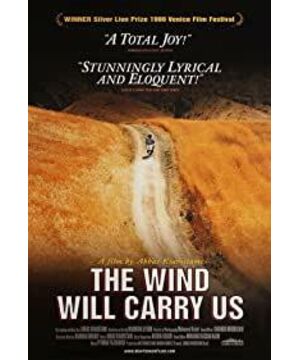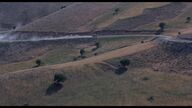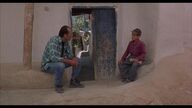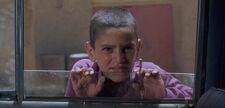The sunny and splendid Iranian plateau under the lens of Abbas is a metaphorically rich, tender and restrained narrative of life, death and intergenerational continuity. Breathtaking, skillful and light-heavy in-depth scheduling and rich camera movement, the camera point of view follows the movement of the characters in the iconic semi-overhead perspective and gradually crosses the stacked courtyard walls of the village. The neat and clean long shot reminds me of security. Geropoulos. With thoughtful and precise composition and bright colors with an oil-paint-like texture, Abbas has created an almost classical, solid and timeless cinematic aesthetic.
Abbas deliberately creates a sense of narrative alienation: the image of the person talking to the reporter (the "engineer") is mostly hidden, the conversation on the hand-held phone is only half audible to the audience, and the camera never defers to the reporter The eyes move to the thing being looked at. On the other hand, Abbas sets up a lot of repetition of dialogue texts and the isomorphism of the front and back plots, trying to further dissolve the narrative and construct a metaphor of the repetition of life and the approaching of death.
The plot of the reporter going into the dark and begging the girl for milk is probably the most exciting part of the whole film. In a sense, milk may be a metaphor for the vitality of life: an ancient image of life associated with milk (Celan's "Death Fugue": dark milk in the morning we drink at night). The theme of the film seems to be about death, and the reporter and his party originally hoped to shoot a video to record the funeral ceremony; however, the image of milk connects another aspect of the film’s narrative: the woman who had not yet given birth yesterday and gave birth today took over the reporter. White tin cans with milk in their hands; a well digger in a hilltop cemetery recounts the milk and love brought by the girl who came to visit him; a sixteen-year-old girl silently squeezes milk in the dim light, and a reporter slowly recites the blazing poetry. While aging tormented the old woman, in the village shrouded in the shadow of death, the baby fell to the ground, the young girl had hopes in her heart, and life grew and flowed, just as the tibia of the deceased at the end of the film flows with the water to the endless flashing future. Life contrasts and balances each other, giving the film a certain subtle lightness. The wind will carry us, a precise and meaningful title.
View more about The Wind Will Carry Us reviews







